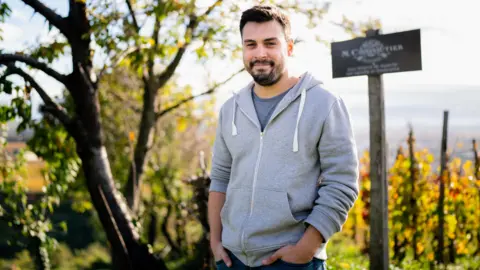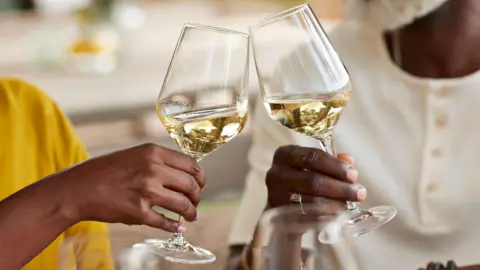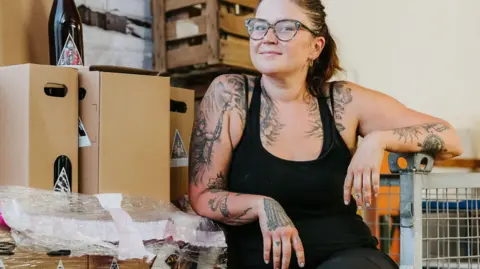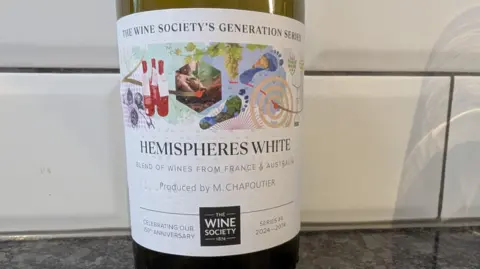The French winemaker whose wines are illegal in his home country
 Chapoutier
ChapoutierWinemaker Maxime Chapoutier would be arrested if he tried to sell two of his newest wines in his native France.
"There would likely be outrage about these wines in France, and that would be a good thing," he says. "Sometimes you need to be provocative to drive change."
The two bottles in question, one white and one red, would be illegal in France because they are made from a blend of French and Australian base wines.
Under both French and European Union law it is forbidden to make a wine that combines EU and non-EU fruit. In France in particular, authorities take such things very seriously.
The French wine industry has a celebrated word called "terroir", which applies to all the environmental factors that affect vines growing in a vineyard, such as the soil, the climate, and the elevation. As a result, wines from a specific place are held in the highest esteem.
Add a strict appellation or classification system for France's wine regions, and the thought of blending French and Australian wine to create a global hybrid would horrify many French wine lovers.
Yet Maxime has done just this, and it is all thanks to one word - Brexit.
For while he cannot sell the two wines in the EU, he can do so in the UK now that London no longer has to follow food and drink rules set by Brussels.
Maxime has created the wines in partnership with UK online retailer The Wine Society, where they are called Hemispheres Red and Hemispheres White. The red is made from syrah grapes, or shiraz as they are called in Australia, while the white is a blend of marsanne and viognier varieties.
The Australian red and white wine components are shipped in bulk to the UK, where they are blended with wine from France's northern Rhone and Roussillon regions before bottling.
Maxime who works for his family's celebrated Rhone-based wine company Chapoutier, say that while he respects France's focus on terroir, there should be room for global blends to also be sold.
"Chapoutier has been making wine for more than 200 years, very terroir driven, and biodynamic," he says. "But more and more people are turning their back on French wines because they don't understand the complicated appellation rules.
"We need to adapt for consumers and make wines more accessible, which international blends can help to do. Maybe the EU law will change. It is also more ecological to ship wine from Australia to Europe in bulk, as you don't have the weight of all the glass bottles."
 Getty Images
Getty ImagesAnother wine company now making wines by combining grapes from two continents is Australian firm Penfolds. It sells reds made from both Australian and Californian grapes, and others that mix Australian and French. Again they cannot be sold in the EU, but they can in the UK, US, Australia and elsewhere.
Penfolds refers to these blends as "wine of the world", and says that they "possess an otherness that can best be described as worldly". Whatever that is supposed to mean.
Unsurprisingly, some more traditional winemakers are not in favour of this development. One such person is Jas Swan, an independent winemaker based in Germany.
While the two-continent blends from Chapoutier and Penfolds are made with care from quality grapes, and priced accordingly, she is fearful that if the trend grows it will mean a lot more cheap, low-grade wine going on sale.
"I believe that those types of wine would have nothing left of any terroir, even before they left their continent," she says. "Those wines would have seen only machine work, heavy additions to keep them clean, and are manufactured to be easy to drink for the masses.
"Why can consumers not be more demanding? The consumerism is insane."
 Tabea Treichel
Tabea TreichelPeter Richards, who holds the top global wine industry qualification, the master of wine (MW), is also sniffy. "The notion of cross-country blending for wine isn't something I find outrageous in itself," he says. "My concern is more that this is about creating novelty for novelty's sake."
His wife, Susie Barrie, who is also an MW, adds: "I remain to be convinced that a wine made by blending grapes from different countries can be great in terms of taste."
By contrast, wine writer Jamie Goode says that development of two-continent wine "is actually quite a fun idea".
"If the wines are good, and made well from good vineyard sites - and not simply a gimmick blending together cheap bulk wines and then slapping a huge margin on the wine - then this is quite interesting.
"The fundamental basis for fine wine is the notion of terroir - that wines come from a place, and their flavour expresses this place in unique ways. But not all wines have to be terroir wines, and there's room for wines like this.
"In some ways, there's a lot of skill required to blend the right wines together to create something interesting coming from such different places."

Pierre Mansour, head of buying for The Wine Society, says he and his colleagues came up with the idea of creating two wines made from grapes from different continents as part of the company's 150th birthday celebrations.
"We were thinking about the future of wine, and we wanted to do something innovative. In the end we thought that one area of innovation is blending, of creating a wine that can mitigate for the impact of climate change on a particular country.
"And from a carbon footprint out of view, it is more environmentally friendly to ship wine in bulk from Australia to the UK. But at the same time we did expect 'terroirists' to say 'hold on this is fundamentally against the French principle of wine'.
"So we approached Chapoutier, thinking that they might say 'are you mad, how dare you insult us', but they were great. They were really enthusiastic."
